|
|
|
Sort Order |
|
|
|
Items / Page
|
|
|
|
|
|
|
| Srl | Item |
| 1 |
ID:
108244
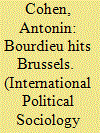

|
|
|
| 2 |
ID:
108234
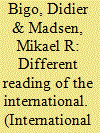

|
|
|
| 3 |
ID:
108243


|
|
|
| 4 |
ID:
108239
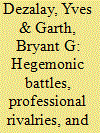

|
|
|
|
|
| Publication |
2011.
|
| Summary/Abstract |
This article draws on research by the authors, especially in Latin America and Asia, to give concrete sociological meaning to the processes of globalization of governing expertise. The article relates professional competition, competing discourses of universals, and imperial competition to the reproduction of state elites and the construction of fields of state and transnational power. The three parts of the discussion in the article involve first, the complexity of the North-South dimension in the import and export of governing expertise; second, the perennial role of imperial processes involving cosmopolitan elites acting as double agents; and third, the role of particular state elites as gatekeepers facilitating and moderating the imperial processes.
|
|
|
|
|
|
|
|
|
|
|
|
|
|
|
|
| 5 |
ID:
108245


|
|
|
| 6 |
ID:
108242
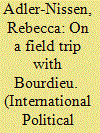

|
|
|
| 7 |
ID:
108235
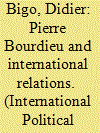

|
|
|
|
|
| Publication |
2011.
|
| Summary/Abstract |
This article demonstrates how the work of Pierre Bourdieu offers a productive way to practice research in international relations. It especially explores the alternatives opened by Bourdieu in terms of a logic of practice and practical sense that refuses an opposition between general theory and empirical research. Bourdieu's preference for a relational approach, which destabilizes the different versions of the opposition between structure and agency, avoids some of the traps commonly found in political science in general and theorizations of international relations in particular: essentialization and ahistoricism; a false dualism between constructivism and empirical research; and an absolute opposition between the collective and the individual. The "thinking tools" of field and habitus, which are both collective and individualized, are examined in order to see how they resist such traps. The article also engages with the question of whether the international itself challenges some of Bourdieu's assumptions, especially when some authors identify a global field of power while others deny that such a field of power could be different from a system of different national fields of power. In this context, the analysis of transversal fields of power must be untied from state centrism in order to discuss the social transformations of power relations in ways that do not oppose a global/international level to a series of national and subnational levels.
|
|
|
|
|
|
|
|
|
|
|
|
|
|
|
|
| 8 |
ID:
108240
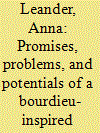

|
|
|
|
|
| Publication |
2011.
|
| Summary/Abstract |
The promise of Bourdieu-inspired analysts to provide a "different reading" of the international is receiving increasing attention in the academic discipline of international relations (IR). This attention also generates awareness and of problems inherent in the Bourdieuian approach and a desire to develop it further (or abandon it). These discussions have often focused on the difficulties that arise for IR as a consequence of the structuralism of Bourdieu's approach, and as such they dovetail with the discussions between Bourdieu's "critical sociology" and the "pragmatic school" in the French context. This article uses these discussions to clarify what it entails to paint a different picture-my picture-of the international using Bourdieu's thinking tools. More specifically, it argues that Bourdieu's thinking can be used as a basis for a non-structuralist staging of the international taking on board the critique raised by pragmatists and integrating many of the insights developed by them. Bourdieu often referred to his own thinking as a "structuralist constructivism," so this article takes Bourdieu's thinking in a direction he may not have liked to go. However, it sticks closely to the spirit of his contention that one should never privilege scholastic theorizing for the sake of theorizing nor hesitate to "read a thinker against himself."
|
|
|
|
|
|
|
|
|
|
|
|
|
|
|
|
| 9 |
ID:
108236
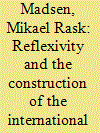

|
|
|
|
|
| Publication |
2011.
|
| Summary/Abstract |
Recent years have seen a surge of interest in applying the sociology of Pierre Bourdieu in international studies as part of a more general sociological turn observable in both international and European studies. However, different from earlier attempts at deploying Bourdieusian sociology in the context of international law, economics, and politics, most of this new Bourdieu-inspired constructivist political science research only marginally addresses what in many ways was the cardinal point of Bourdieu's work: his attempt at devising a reflexive sociology. This article's basic claim is that the most significant contribution Bourdieusian sociology can make to international (and European) studies is not achieved by adaptation or transplantation of key concepts (field, habitus, and so on) to a set of research objects that remain by and large predefined by other disciplines. Instead, I contend that it is by deploying the underlying sociological practice of Bourdieusian sociology to international objects in terms of conducting a reflexive sociology of the international. To substantiate my claim, I make three more specific arguments. In the first section, I argue for the need for "objectivizing" the research object in terms of "double reflexivity" with respect to both object and researcher. In the second part, I suggest that key Bourdieusian notions are precisely tools for this scientific operation by providing a relational and integrative approach. In the third part, I compare this approach with a cross section of research on international human rights and thereby suggest how it provides a different reading of the international.
|
|
|
|
|
|
|
|
|
|
|
|
|
|
|
|
| 10 |
ID:
108241
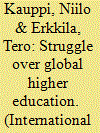

|
|
|
|
|
| Publication |
2011.
|
| Summary/Abstract |
This article examines the intensification, since the creation of the so-called Shanghai list of world universities in June 2003, of a political struggle in which a variety of actors, universities, national governments, and, more recently, supranational institutions have sought to define global higher education. This competition over global higher education has highlighted issues such as the internationalization and denationalization of higher education, the international mobility of students, the role of English language as the language of science, and the privatization of higher education. In contrast to IPE or Marxist analyses, we analyze the symbolic logic of ranking lists in higher education, their uses, and the European Commission's initiative to create an alternative world university classification (see World Social Science Report, UNESCO Publishing; Europa zwischen Fiktion und Realpolitik/L'Europe-Fictions et réalités politiques, Transcript for analysis). This initiative represents a political move in a process of rapid restructuration of higher education at the global level.
|
|
|
|
|
|
|
|
|
|
|
|
|
|
|
|
|
|
|
|
|